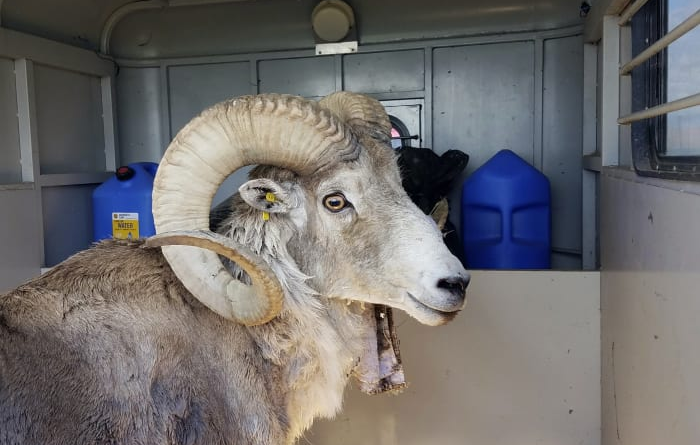Montana man used animal tissue and testicles to breed 'giant' sheep for sale to hunting preserves – WSLS 10
WEATHER ALERT
Matthew Brown
Associated Press
Published:
Updated:
Matthew Brown
Associated Press
BILLINGS, Mont. – A Montana rancher illegally used tissue and testicles from wild sheep killed by hunters in central Asia and the U.S. to breed “giant” hybrid sheep for sale to private hunting preserves in Texas, according to court documents and federal prosecutors.
Arthur “Jack” Schubarth, 80, of Vaughn, Montana pleaded guilty to felony charges of wildlife trafficking and conspiracy to traffic wildlife during an appearance Tuesday before a federal judge in Great Falls. Each count carries a maximum penalty of five years in prison and a $250,000 fine.
Recommended Videos
Court documents describe a yearslong conspiracy, beginning in 2013, in which Schubarth and at least five other people sought to create “giant sheep hybrids” by cross-breeding different species. Their goal was to garner high prices from hunting preserves where people shoot captive trophy game animals for a fee.
Using biological tissue obtained from a hunter who killed a wild sheep in Kyrgyzstan belonging to the world’s largest species of the animals — Marco Polo argali sheep — Schubarth procured cloned embryos of the animal from a lab, according to court documents.
The embryos were later implanted in a ewe, resulting in a pure Marco Polo argali sheep that Schubert named “Montana Mountain King,” the documents show. Semen from Montana Mountain King was used to artificially impregnate other ewes to create a larger and more valuable species of sheep, including one offspring that he reached an agreement to sell to two people in Texas for $10,000, according to the documents.
Male argali sheep can top 300 pounds with horns up to 5 feet long, according to officials, making them prized among some hunters. They are protected under international convention as a threatened species and outlawed for import into Montana to protect native sheep from disease and hybridization.
A person who was not named in court documents shipped 74 ewes of a prohibited sheep species from Minnesota to Schubarth’s ranch to be artificially inseminated with Montana Mountain King semen, the documents show. Offspring that had only a portion of the central Asian sheep’s genetics sold for lesser amounts.
In 2019, Schubarth paid $400 to a hunting guide for testicles from a trophy-sized Rocky Mountain bighorn sheep killed in Montana. Schubarth extracted semen from bighorn sheep testicles and used it to breed large bighorn sheep and sheep crossbred with the argali species, the documents show.
Assistant U.S. Attorney General Todd Kim described Schubarth’s actions as “an audacious scheme to create massive hybrid sheep species to be sold and hunted as trophies.” Kim said the defendant violated the Lacey Act that restricts wildlife trafficking and prohibits the sale of falsely labeled wildlife.
Schubarth said when reached by telephone on Wednesday that his attorney had advised him not to talk about the case.
“I would love to talk about it but can’t do it now,” he said. His attorney, Jason Holden, did not immediately respond to telephone messages seeking comment.
Authorities agreed under the terms of a plea deal not to pursue further charges against the defendant pending his cooperation in the government’s ongoing investigation in the wildlife trafficking case.
Montana Mountain King is in the custody of the U.S. Fish and Wildlife Service, according to Department of Justice spokesperson Matthew Nies. As part of the plea deal, Schubert agreed to quarantine any other sheep containing Marco Polo argali genetics and any bighorn sheep that were harvested from the wild.
The deal also allows federal wildlife officials to inspect and, if needed, neuter the animals.
Captive animal facilities where game species can be raised and hunted were banned in Montana under a 2000 ballot initiative. But they remain legal in some other states.
Schubarth’s 215-acre ranch is state-licensed as an alternative livestock facility, said Montana Fish, Wildlife and Parks spokesperson Greg Lemon. It was grandfathered in when the 2000 ballot initiative passed and has continued to operate, although hunting is prohibited, Lemon said.
Sentencing for Schubarth is set for July 11 before U.S. District Judge Brian Morris.
Copyright 2024 The Associated Press. All rights reserved. This material may not be published, broadcast, rewritten or redistributed without permission.
Click here to take a moment and familiarize yourself with our Community Guidelines.
If you need help with the Public File, call 540-512-1558.
Copyright © 2024 WSLS.com is managed by Graham Digital and published by Graham Media Group, a division of Graham Holdings.




